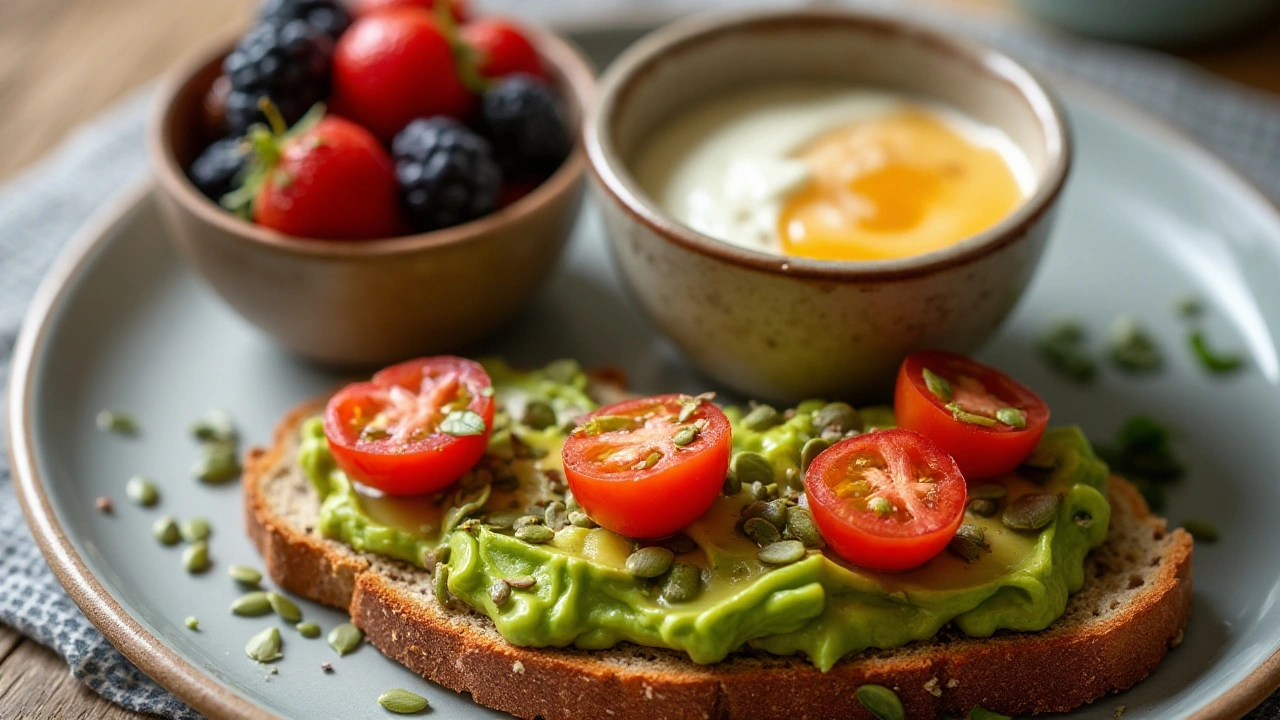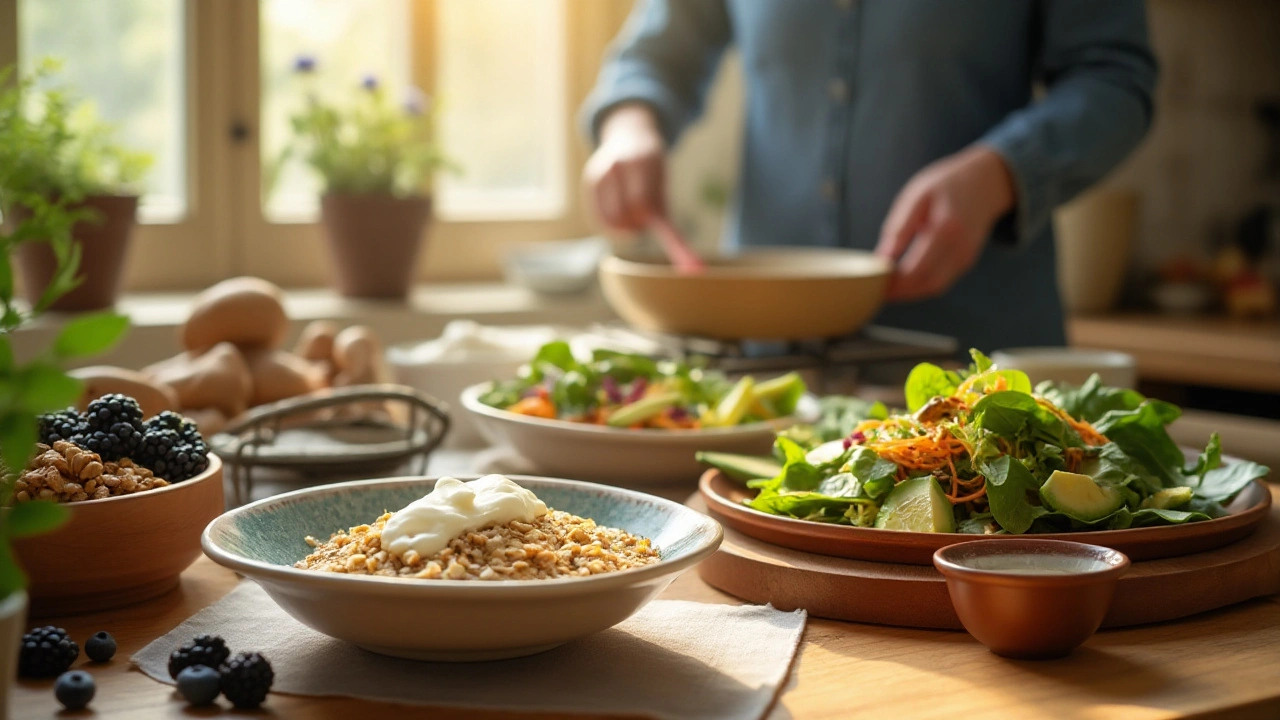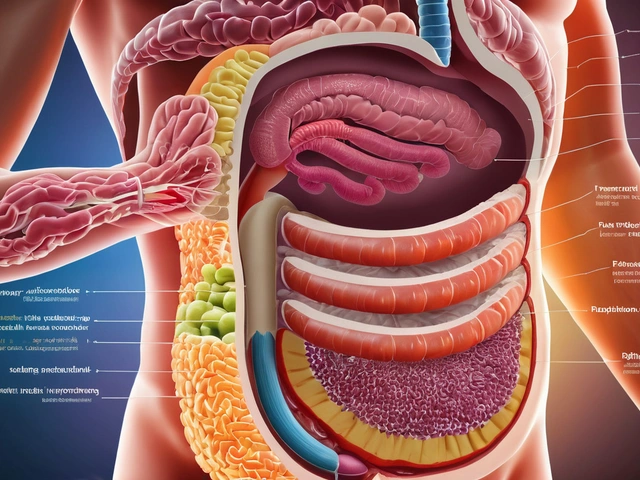The journey towards a healthier gut often starts on your plate. Many people overlook how dietary choices influence their digestion, yet the foods we eat play a pivotal role. The gut, often called the 'second brain,' is a complex system that needs nourishment to function properly.
Thankfully, nature provides a bounty of delicious foods that can support and improve gastrointestinal health. From fibrous fruits to probiotic-rich staples, these food choices can transform your digestion and overall well-being.
Step into a world where your belly feels as good as your heart does when you eat right. Dive into these top picks that can help make your gut happy and healthy.
- Understanding Gastrointestinal Health
- Top Ten Gut-Friendly Foods
- Integrating These Foods into Your Meals
- Additional Tips for Maintaining a Healthy Gut
Understanding Gastrointestinal Health
The gastrointestinal tract is an intricate system responsible for digesting food, absorbing nutrients, and expelling waste. It's a complex environment that balances numerous microorganisms, and its health can impact how we feel both physically and mentally. The concept of a 'happy gut' has gained more attention, highlighting that a healthy digestive system is key to maintaining energy, mood, and immunity. Often referred to as the 'second brain' of the body, the gut is lined with millions of nerve cells that connect with the brain, indicating an intrinsic relationship between the two. A disturbance in this system can lead to digestive issues such as bloating, constipation, or diarrhea, and extend beyond to influence anxiety and depression.
Gut health is not only about acrobatics with fibers and probiotics. Several studies show the connection between a poor diet, stress, and a disturbed gut microbiome. The intestinal flora, which houses trillions of bacteria, plays a crucial role in how our body processes food and fights off harmful pathogens. A study published in Nature Communications demonstrated that diverse gut microbiota might even affect the brain's cognitive functions. Recognizing symptoms like discomfort after meals or frequent indigestion often acts as a sign to rethink food choices and lifestyle habits if things go astray.
One should care more about an unhealthy gut when realizing that bacteria imbalance can lead to serious illnesses such as inflammatory bowel disease, obesity, and type 2 diabetes. It's essential to focus on eating a balanced diet rich in fiber, regularly consuming fermented foods and adequate hydration. Notably, fermented foods like yogurt and kimchi introduce beneficial bacteria, promoting a balanced microbiome. A quote from Dr. Michael Ruscio, a well-known gut health expert, echoes this sentiment:
"Your gut health is so central to your overall health and well-being. Prioritizing it can really change your life."Managed properly, gut health can enhance our lives, leading to improved mental clarity, brighter moods, and a resilient immune system. Never undermine the power of listening to what your gut is trying to tell you—it knows things you might overlook!

Top Ten Gut-Friendly Foods
Eating mindfully can do wonders for your digestive health. While every person's body is unique, most people can benefit from incorporating foods that are naturally good for the gut. One such example is yogurt, a star player in promoting gut health. This creamy delight is rich in probiotics, which are beneficial bacteria that help maintain the natural balance of organisms in your intestines. Regular consumption of yogurt can aid digestion and boost your immune system. So, the next time you're grocery shopping, consider adding yogurt to your list for a healthier gut.
Another powerful food is kefir. Similar to yogurt, kefir is fermented and packed with probiotics. However, kefir tends to have more strains of these beneficial bacteria, making it an even stronger ally for gut health. Drinking kefir on a daily basis can help improve digestion, reduce bloating, and keep your gut flora balanced. A notable aspect of kefir is that it often contains yeasts known to counteract harmful bacteria, setting it apart from other probiotic foods. Including kefir in your daily routine might be just what you need to get your digestion back on track.
When we think about gut-friendly foods, fiber is a key component that comes to mind. Legumes, such as lentils and chickpeas, are excellent sources of fiber, which is crucial for healthy digestion. Fiber adds bulk to your stool and helps food pass through your digestive system more easily. It can also prevent constipation and maintain a healthy gut microbiome. Not to mention, legumes are versatile and can be added to countless recipes, from soups to salads, offering not just health benefits but also delicious flavors and textures.
Fruits, too, play a crucial role in nurturing your gut. Apples, for example, are rich in pectin, a type of soluble fiber that promotes the growth of good bacteria in your gut. Eating a few slices of apple daily can have profound effects on your digestive health. Another gut-boosting fruit is the banana, which is high in prebiotics. Prebiotics are beneficial because they provide food for probiotics, allowing them to thrive in your gut. With bananas on your menu, your digestive system will be teeming with health-supporting bacteria.
Vegetables such as broccoli also deserve a spot on this list. Broccoli is incredibly nutritious and contains fiber, vitamins, and a unique compound called sulforaphane. This compound has been found to support the gut lining and reduce inflammation, making it a valuable addition to any diet focused on healthy digestion. Roasted, steamed, or raw, broccoli can be a delicious and gut-nurturing addition to countless dishes, bringing both taste and health benefits.
Adding the right kind of grains to your diet can also aid digestion. Whole grains like oats are brimming with fiber and essential nutrients. They're not only filling but also feeding your gut bacteria, helping them flourish. A bowl of oatmeal for breakfast can be an excellent start to the day, providing long-lasting energy and supporting gut health. Alternatively, consider trying quinoa, a super grain that's easy to digest and packed with protein, fiber, and antioxidants.
Let's not forget about the power of tea. A cozy cup of herbal tea can do more than just warm you up on a cold day. Peppermint tea, for instance, is particularly known for aiding digestion. It has calming properties that can relax your digestive tract muscles, alleviating discomfort and bloating. Drinking peppermint tea after meals can be a soothing ritual that supports digestive health.
Last but not least, remember the mighty ginger. This spicy root has been used for centuries to combat nausea and improve digestion. Whether added to stir-fries or steeped in tea, ginger offers anti-inflammatory properties that can soothe an upset stomach and improve overall gut health. A daily cup of ginger tea can ease your digestive woes and bring warmth and wellness into your routine, bridging the gap between taste and health.

Integrating These Foods into Your Meals
Bringing gut-friendly foods into your daily diet doesn't have to be a difficult task. One of the simplest ways to do this is by starting small and making gradual changes to your meals. A great way to begin is by including yogurt or kefir with your breakfast. Both are rich in probiotics, which are beneficial bacteria known to enhance digestive health. You can top them with fresh fruits like berries or bananas for added fiber, which supports a healthy digestive tract. Over time, you'll start noticing subtle yet positive changes in how you feel.
Adding vegetables like broccoli, spinach, and kale to your lunch can greatly benefit your system. Green leafy vegetables aren't just rich in fiber, but they also contain nutrients like magnesium which can help ease the digestive process. A simple way to include these is through salads or by blending them into smoothies. If you prefer cooked meals, consider roasting these veggies or sautéing them with a bit of olive oil and garlic, which can make a delicious, quick side dish.
Lentils, chickpeas, and other legumes can play a starring role in your dinners. These foods are not only excellent sources of protein but are also high in fiber, making them perfect companions for your healthy digestion plan. An easy recipe could be a lentil stew with tomatoes, carrots, and spices like cumin and turmeric, which add flavor and offer anti-inflammatory benefits. You can substitute meat in many recipes with legumes for a healthier, gut-friendly alternative.
"Let food be thy medicine and medicine be thy food." - Hippocrates
Incorporating fruits such as apples, pears, and oranges as snacks or desserts can help satisfy your sweet cravings while boosting your digestive health. These fruits are not only refreshing but packed with soluble fiber, helping you stay full longer and supporting your overall gut function. Slicing fruits and mixing them with nuts or seeds can introduce variety into your snacking routine.
Don’t forget grains. Whole grains like oats, quinoa, and brown rice should become a staple in your pantry. They retain their bran and germ, making them richer in nutrients and especially beneficial for your digestion. Consider replacing your usual white rice or pasta with these healthier options. You can start your day with a hearty oatmeal, use quinoa in salads, or serve brown rice as a side to your main course. Understanding how to easily include these foods will help you take control of your digestive health without needing complex diets or expensive ingredients.
To complement these changes, make sure you stay hydrated throughout the day. Water is essential for every digestive function, as it helps break down food, allowing your body to absorb nutrients more effectively. Herbal teas like peppermint or ginger can also soothe the stomach and improve digestion. The key is consistency and making conscious choices every time you pick up your fork or spoon, leading to sustainable healthy digestion.

Additional Tips for Maintaining a Healthy Gut
When it comes to keeping your gut in tip-top shape, there are some simple yet effective practices you can add to your daily routine. It's about more than just eating the right foods, although that is crucial. You have to think about your overall lifestyle because everything from stress levels to sleep habits can impact your digestive health. Many people don't realize how critical hydration is to the digestive process. Drinking enough water helps your body break down food, allowing your system to absorb nutrients more effectively. Make it a habit to keep a water bottle within reach, ensuring you're adequately hydrated throughout the day.
Mindful eating is another key aspect of maintaining a healthy gut. With the fast-paced nature of today’s world, it is common to eat on the go or in front of a screen without truly noticing how much or what we are consuming. Slowing down to chew your food thoroughly can be surprisingly beneficial. It not only aids digestion by breaking food into smaller pieces but also gives your brain time to register when you are full. This simple act of mindfulness can help prevent overeating and reduce digestive stress. Engaging in regular physical activity is incredibly beneficial to your digestive system as well. Exercise increases blood flow to your organs and helps stimulate intestinal activity, which can lead to more effective digestion and elimination. Start integrating at least 30 minutes of moderate exercise into your daily routine, even if it's just a brisk walk around your neighborhood.
Managing stress is perhaps one of the most overlooked facets of gut health. The gut and brain are intimately connected, and constant stress can wreak havoc on your digestion. Techniques such as yoga, meditation, or simple deep-breathing exercises can reduce stress and, consequently, support your gut health. As Dr. Michael Gershon, a well-known neuroscientist, said,
“The gut can ‘talk’ to the brain in ways that significantly impact our moods and perceptions.”Investing some time in activities you love is an easy way to keep stress at bay.
Lastly, don’t underestimate the importance of sleep. Your body, including your digestive system, regenerates during sleep. Aim for 7-9 hours of quality sleep each night to give your body the time it needs to repair and rejuvenate. If you struggle to get to sleep, consider creating a relaxing bedtime routine that includes dimming the lights, reading a book, or listening to calm music. By focusing on these lifestyle aspects alongside your dietary choices, you can ensure comprehensive care for your digestive health.





